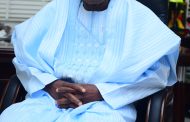Above is the title of a new research report on Nigeria’s electoral politics. It is an interesting document which everyone should read cover to cover. One reason for that is because documents such as this can be as geopolitically problematic as they could also offer proactive ways of getting out of cul de sac for beleaguered African countries such as Nigeria. When an institution such as the United States Institute of Peace, (USIP), conducts a research which predicts electoral violence in an impending election in Nigeria, what is at stake in such a research is not the reality of violence itself but the discourse of violence which could be productive of that reality. It is in that sense that the research under review could be read as being in line with the narrative of Kaplan’s The Coming Anarchy. But that is just one side of the story.

Dr. Chris Kwaja of the Modibbo Adama University of Technology, Yola and one of the researchers
The other side and the more positive one is a research report based on self-reporting by key players in the Nigerian electoral process which points to the possibility of electoral violence. Since there is no independent reality outside of perception, this research report hands down a credible alert to managers of the Nigerian State on the sore points and what to do to avoid them. The choice is up to the choice maker which of the two ways to read the document that is coming from the United States Institute of Peace on the impending election in Nigeria.
Basically, the document is the formal report of an engagement with the 2019 elections in Nigeria. The USIP has let out snippets of this report earlier on. It situates the impending election in the dialogic meaning making of a broad flank of respondents listed to stretch from “election administrators, political party representatives, security officials, civil society and youth groups, the media, traditional and religious leaders, prominent community figures, business people, academics, and members of militias and cults”. As such, the report is an ensemble of voters, candidates, and elected officials, suggesting that all voices have been heard. In other words, it is not one of these reports held hostage by statistical sense of representativity but still well spread in an even more sensitive manner.

Ms Oge Onubogu, another of the three-person research team at a previous occasion
On this score, it is difficult to contest the conclusion about “a broader narrative of mistrust and uncertain confidence in state institutions” as the overarching opinion of Nigeria’s key electoral actors. In that case, a sentence such as “Despite the risks, serious violence in 2019 is not inevitable” on page two is simply being diplomatic or sensitive to risk of USIP being misread. For, it goes without saying or there can be no better signs of trouble in any society at all if all Nigeria’s key electoral actors are expressing mistrust and lack of confidence in state institutions. This is more so in the context of observable rising recriminations, unworkable elite pacts, an overwhelmed state and an unfocussed power elite.
To this extent, what the report raises is the question of a larger crisis of instability of which the possibility of electoral violence in 2019 may be no more than an even lesser manifestation. It is thus a frightening report because state collapse has been the dominant discourse about Nigeria. Nigeria must be God’s own miracle to escape a reality which has been invoked by almost all actors – including the Nigerians themselves – in framing the country for a long time.
Perhaps, the task the USIP has imposed on everyone, particularly Nigerian party leaders, election management body, the security chiefs and intellectuals of statecraft is for each and every of them to read this particular research report cover to cover, make it the subject of open discussions and declare commitment to forestalling not only electoral violence but also state collapse. The Nigerian elite would have no excuse for failing to transcend running a ramshackle state always at war with itself. Violence and disorder is not African and Africa as a zone of failure is a challenge to be overcome, starting with Nigeria getting out of this uncertainty every four years. Haba!





























2 Comments
Pingback: Nigeria’s 2019 Elections: Change, Continuity, and the Risks to Peace http://inter… – Nigeria Elections
Augustine Akhagbeme
In Nigeria, every election year is often been accompanied with fear and trepidation :fear of electoral violence and the disintegration of the state. It is often dismissed as a western propaganda since Nigeria always have a miraculous way of weathering the storm. But truly, this is a tragedy lurking in the dark, a real trouble waiting to exhale. This is further fueled by the incessant elite cyclical distrust or mistrust and their overwhelming zeal to outsmart one another. Those who constitute themselves as the philosopher king, “the National cohort ” etc help to make matters worse. In reality, we do not need the USIP to alert us of the impending doom :we live with this stark reality everyday. God save Nigeria.